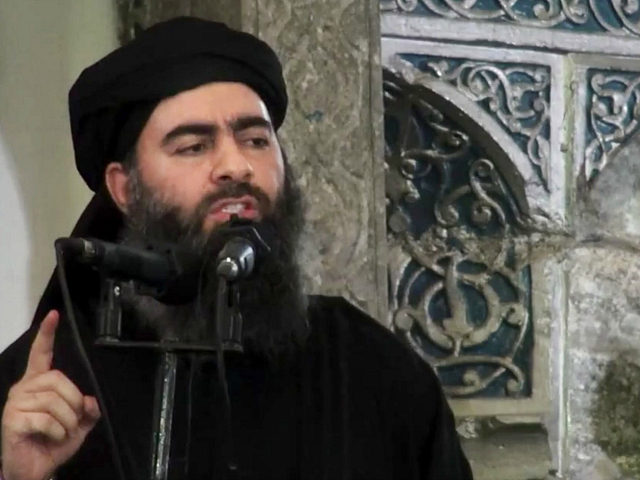Islamic State (ISIS/ISIL) chief Abu Bakr al-Baghdadi is currently alive in Syria, a top Kurdish counterterrorism official recently told Reuters, denying reports from Russia and a Syrian war monitor group that claim otherwise.
“Baghdadi is definitely alive. He is not dead. We have information that he is alive. We believe 99 percent he is alive,” Lahur Talabany, a top Kurdish counter-terrorism official, told Reuters.
However, U.S. Maj. Adrian Rankine-Galloway, a Pentagon spokesman, told Breitbart News that there is no evidence suggesting the Kurdish official’s claims are accurate.
“There have been several past claims of this kind that have been proven false, and we have seen no definitive proof that this report is true either,” declared the Marine Corps major, referring to the Reuters article, adding that “the [U.S.-led] coalition and the global community would welcome the news of al-Baghdadi’s demise.”
The Pentagon maintains that it can neither confirm nor deny the death of the ISIS “caliph.”
On July 11, American Gen. Stephen Townsend, the top commander of the U.S.-led coalition, told reporters:
There’s been a lot of media interest in the whereabouts and status of ISIS leader Abu Bakr al-Baghdadi. Despite all the helpful reports to us from every source imaginable, I’m unable to confirm or deny where he is or whether he is alive or dead. Let me just say for the record, my fervent hope is it is the latter.
That assessment still stands, according to the Pentagon spokesman.
Echoing Russian news outlets that have cited officials in Moscow, the U.K.-based Syrian Observatory for Human Rights, which uses ground sources to monitor the war in Syria, has claimed that it has irrefutable evidence of Baghdadi’s demise in war-ravaged Syria.
“Top-tier commanders from IS [Islamic State] who are present in Deir Ezzor province have confirmed the death of Abu Bakr al-Baghdadi, emir of the Islamic State group, to the Observatory,” Rami Abdel Rahman, the Observatory’s director, told Agence France-Presse (AFP).
Eastern Syria’s Deir-Ezzor province is “shaping up as the final territorial refuge for ISIS as Russian, Syria, Iranian and U.S. backed coalition forces all advance” noted the Washington Times last week.
Kremlin airstrikes killed Baghdadi outside of Syria’s Raqqa in May, reported various Russian news outlets, citing Moscow defense officials.
“I’ve received some reporting since then that suggested he was not killed there by the Russians,” noted Gen. Townsend last week, adding, “Since then, we’ve heard all kinds of reporting that he’s alive, that he’s dead. Quite honestly, don’t know. I hope he’s deader than a door nail. If he’s not, as soon as we find out where he is, he will be.”
In March, the Arabic-language Iraqi outlet al-Sumaria News indicated that Baghdadi had fled Mosul in Iraq for Syria.
The ISIS chief advised his subordinates in an alleged “farewell speech” to also “flee and hide” or “blow themselves up when surrounded by Iraqi forces.”
Mosul, the terrorist group’s former capital in Iraq, has fallen into the hands of U.S.-backed local forces.
In May, Baghdadi reportedly began fleeing once again.
That time, the ISIS leader was allegedly leaving Raqqa for Deir-Ezzor, Madan, or other areas in the Euphrates River Valley. The move came in anticipation of the U.S-backed operation to liberate Raqqa, which serves as the ISIS capital in Syria.
Local Arab and Kurdish forces in Syria, supported by the U.S.-led coalition, are also expected to liberate Raqqa.
“Their options are to surrender or be killed,” declared Gen. Townsend on July 11, referring to ISIS and its leader Baghdadi.

COMMENTS
Please let us know if you're having issues with commenting.